The conference was opened by Mannfred Kronfeller, the main organisor of the conference, and by the Vice Rector of the Technical University of Vienna, Hans Kaiser.
There were also short introductions by Evelyne Barbin, the chair of the HPM group, who outlined the history of the ESUs, and by Costas Tzanakis, who mentioned that representatives of 28 countries are present at the conference. That's not bad.
The first plenary speaker was Uffe Jankvist from Denmark. He talked about a teaching experiment that he has conducted (and which formed part of his PhD), where the history of mathematics played a major part. The topic was error-correcting codes and cryptography. But while this was the background of his talk, his real concern was to get more specific about what role history of mathematics can have in teaching. In particular, he studied whether he could see signs that the students would have meta-issue reflections on mathematics that were anchored in the mathematical in-issues that they were working on.
I find Uffe's approach very interesting. Instead of just claiming that "history of mathematics can make students reflect on the epistemology of mathematics", for instance, he sets out to study particular interpretations of this claim. It makes for a more nuanced and informed view of the part history of mathematics can play.
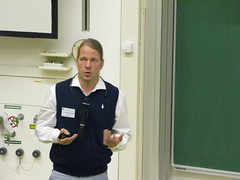
Uffe argues powerfully for the use of empirical studies (in this sense) in research on history of mathematics. I agree that this is one important path to follow. However, I believe that we still need the other paths as well. While studies such as this are convincing, they do too little to provide examples and materials for teachers to trz. For many teachers, successful attempts at including history of mathematics in their own classrooms are more powerful than researchers' results.
Then there was time for workshops. Workshops form a major part of the ESUs, as the ESU is supposed to give more "hands-on-experiences" than ordinary conferences. I attended Masami Isoda's workshop on how he has used the dbook software to create digital editions of textbooks with appended interactive materials. The example given was of historical instruments (from van Schooten's book). We were also given the chance of recreating the historical instruments by means of paper (see the wonderful instrument created by the group consisting of Jan van Maanen and me - I must admit that Jan did most of the work...)
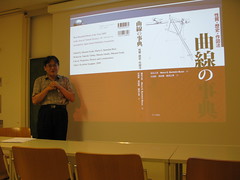
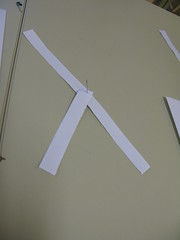
I think this is an interesting way of connecting the textbook with more interactive media.
Then I attended a three-hour workshop with Uffe Jankvist. There have been discussions during the conference of whether the three-hour format is too long. In my opinion, Uffe's workshop provides an existence proof that three hours may at times be about the right amount of time. Uffe wanted the participants to analyze some bits of transcripts with the same analytical tools that he had used in his PhD. In the beginning, the participants were quite hesistant, as both the mathematical and historical topic under consideration was unfamiliar and the analytical tools were new to us. However, by the end of the workshop, it seemed to me that everybody was participating in trying to find the "potential anchoring points" that Uffe was interested in.
As mentioned above, I think that there is great potential in getting more detailed concepts of how history of mathematics may be included in teaching, making it possible for teachers to be more conscious about exactly which effects they are trying to produce in a particular circumstance.
Oral presentations are not such a high priority at the ESUs, so on Monday they were taking place from 1830 to 2000 at night. Gerlinde Faustmann talked about "Classroom experiences with history of mathematics", following the path mentioned above of providing examples and ideas for teaching mathematics using history. Then I had my presentation on the Norwegian literature on history of mathematics, where I outlined several points of potential improvements. (I keep thinking I should write a book on the subject - but where is the time for it...) And finally, Po-Hung Liu discussed "the evolution of college students' epistemological views of mathematics in a history-based class". This was a combination of teaching ideas with a somewhat detailed look at what students did get out of it.
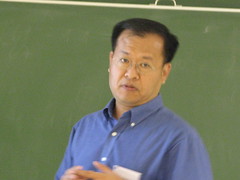
Of course, giving such a short summary of the first 11 hours of the conference does not allow for too many details. The proceedings of the conference will be available perhaps a year from now, so more details will be obtainable there...
I will continue with a discussion of day 2 in a later post.
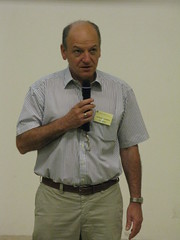
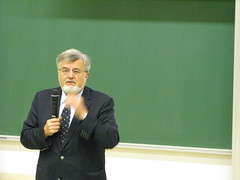




No comments:
Post a Comment